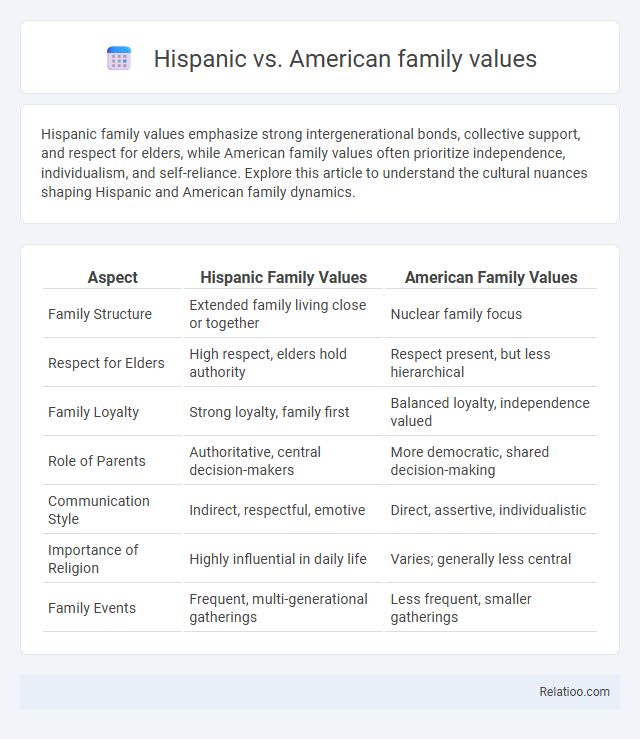Hispanic family values emphasize strong intergenerational bonds, collective support, and respect for elders, while American family values often prioritize independence, individualism, and self-reliance. Explore this article to understand the cultural nuances shaping Hispanic and American family dynamics.
Table of Comparison
| Aspect | Hispanic Family Values | American Family Values |
|---|---|---|
| Family Structure | Extended family living close or together | Nuclear family focus |
| Respect for Elders | High respect, elders hold authority | Respect present, but less hierarchical |
| Family Loyalty | Strong loyalty, family first | Balanced loyalty, independence valued |
| Role of Parents | Authoritative, central decision-makers | More democratic, shared decision-making |
| Communication Style | Indirect, respectful, emotive | Direct, assertive, individualistic |
| Importance of Religion | Highly influential in daily life | Varies; generally less central |
| Family Events | Frequent, multi-generational gatherings | Less frequent, smaller gatherings |
Overview of Hispanic and American Family Values
Hispanic family values emphasize collectivism, strong intergenerational bonds, and prioritization of family obligation, reflecting close-knit support systems often involving extended relatives. American family values typically highlight individualism, independence, and nuclear family structures, focusing on personal achievement and self-reliance. The contrast between these cultural frameworks shapes differing expectations around caregiving, decision-making, and familial responsibilities.
Historical Roots of Family Traditions
Hispanic family values emphasize collectivism, respect for elders, and strong kinship ties rooted in indigenous, Spanish colonial, and Catholic influences dating back centuries. American family values often prioritize individualism, personal achievement, and nuclear family independence, reflecting Enlightenment ideals and frontier settler history. The concept of family obligation in Hispanic cultures historically includes mutual aid and intergenerational support, contrasting with the more self-reliant family models shaped by American social and economic structures.
Family Structure and Roles
Hispanic family values often emphasize extended family structures with strong intergenerational bonds and clearly defined roles, where elders are respected and younger members are expected to contribute to household responsibilities. American family values typically prioritize nuclear family units with more individualistic roles, promoting independence and self-expression within the family dynamic. Your understanding of these cultural differences can enhance communication and collaboration in multicultural environments by recognizing the significance of family obligation and role expectations.
Importance of Extended Family
Hispanic family values emphasize the central role of extended family, where multigenerational households provide emotional support, caregiving, and a strong sense of identity. American family values often prioritize nuclear family independence and individualism, with less frequent day-to-day involvement from extended relatives. Family obligation in Hispanic cultures involves collective responsibility and frequent interdependence, contrasting with the more autonomy-driven approach seen in mainstream American families.
Parenting Styles and Approaches
Hispanic family values emphasize collectivism, respect for elders, and strong family obligation, often reflected in parenting styles that prioritize close-knit support, nurturing discipline, and intergenerational guidance. American family values generally highlight individualism, independence, and self-expression, with parenting approaches favoring autonomy, open communication, and encouraging personal achievement. These cultural differences shape how parents set expectations, provide emotional support, and enforce discipline, influencing children's development and family dynamics in distinct ways.
Respect for Elders and Authority
Hispanic family values emphasize deep respect for elders and authority, often seen through close-knit family ties and multigenerational households where elders are honored and their guidance is sought in decision-making. In American families, respect for elders exists but is balanced with encouraging individualism and independence, where authority may be questioned to foster personal growth. Your understanding of these cultural differences can enhance communication and support within diverse family dynamics.
Individualism vs Collectivism
Hispanic family values emphasize collectivism, prioritizing strong interdependent relationships, multigenerational household support, and shared family obligations. In contrast, American family values tend to reflect individualism, promoting personal independence, self-reliance, and individual achievements over collective responsibilities. These cultural differences shape contrasting approaches to family roles, decision-making, and support networks within Hispanic and American communities.
Religious and Cultural Influences
Hispanic family values emphasize strong religious influences, particularly Catholicism, which shapes a deep sense of family obligation through rituals, prayers, and collective celebrations. American family values often prioritize individualism and personal freedom, with diverse religious beliefs influencing family dynamics more variably across cultural backgrounds. Cultural influences in Hispanic families foster intergenerational support and respect, whereas American families may lean toward nuclear family independence, affecting how family obligations are perceived and enacted.
Communication Styles Within the Family
Hispanic family values emphasize collectivism and strong family obligation, with communication styles tending to be expressive, respectful, and often indirect to maintain harmony and avoid conflict. American family values prioritize individualism and personal autonomy, favoring direct and assertive communication that encourages openness and self-expression. These differing communication approaches reflect the underlying cultural priorities: Hispanic families focus on nurturing interconnectedness, while American families value independence within familial interactions.
Shifting Family Values in Modern Society
Hispanic family values emphasize strong intergenerational ties and collective responsibility, whereas American family values prioritize individualism and personal independence. Shifting family values in modern society reveal a blend of these cultural norms, with You navigating evolving expectations around family obligation and personal goals. This transition reflects greater diversity in household structures and changing societal roles that influence family dynamics globally.

Infographic: Hispanic vs American family values
 relatioo.com
relatioo.com